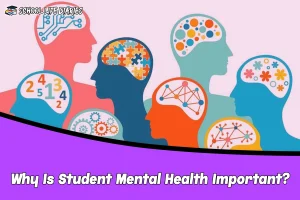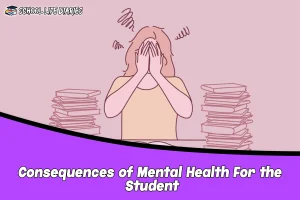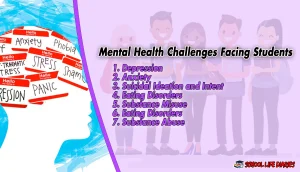In recent years, there has been a growing concern about the mental health of students in academic institutions around the world. Mental health refers to a person’s overall psychological well-being and includes factors such as emotional stability, cognitive functioning, and social interactions. The importance of student mental health cannot be overstated, as it affects not only the individual but also their communities and society at large. In this article, we will explore the consequences of poor mental health for students, campuses, and others.
We will also discuss the challenges facing students in maintaining good mental health in an academic environment and what academic institutions can do to support them. It is crucial that we recognize the significance of student mental health issues and work towards creating a supportive environment that promotes their well-being.
What is Mental Health?
The concept of mental health refers to a state of emotional and psychological well-being that encompasses an individual’s ability to cope with the challenges of everyday life, maintain fulfilling relationships, and contribute to society in a meaningful way. It is not just about the absence of mental illness or disorders, but also about having positive self-esteem, feeling contented with life, and being able to manage stress effectively.
Mental health is an essential component of overall health and well-being. Despite its importance, there are many myths surrounding mental health that lead to stigma and discrimination against individuals who experience mental health issues. These myths include beliefs that people with mental illnesses are weak or violent or that they cannot be cured.
Through education and awareness campaigns, it is possible to challenge these misconceptions and promote a more inclusive understanding of mental health. Prevention and treatment are crucial for maintaining good mental health. Prevention involves promoting healthy lifestyles such as regular exercise, good nutrition, adequate sleep, stress management techniques like meditation or yoga, social support systems like family and friends as well as early intervention when symptoms first appear.
Why Is Student Mental Health Important?
The significance of preserving emotional well-being among learners cannot be overlooked, as it plays a pivotal role in shaping their overall success and satisfaction in life. The importance of addressing student mental health has gained significant attention in recent times due to the alarming rise in mental health issues among students.
The stressors that students face today, including academic and social pressure, can lead to anxiety, depression, and other psychological disorders. Awareness about student mental health is essential to create a supportive environment for students.
Prevention and early intervention are key components of promoting student mental health. Providing resources such as counseling services, peer support groups, and educational programs on stress management can help prevent the onset of more severe psychological disorders among students.
By recognizing the importance of addressing student mental health and taking proactive steps toward prevention and intervention, we can create an environment that fosters growth and well-being for all learners.
How Can Academic Institutions Support Student Mental Health?
Academic institutions can promote well-being among learners by implementing various strategies to support their emotional needs. Collaborative initiatives between academic and mental health professionals can create a supportive environment that fosters students’ mental and emotional well-being.
These initiatives may include training faculty members to identify students who are struggling with mental health issues, creating wellness programs for students, or establishing campus-wide policies that prioritize mental health awareness. Counseling services also play a critical role in supporting students’ mental health needs.
Academic institutions can provide counseling services to students through on-campus clinics or partnerships with community-based organizations. Counseling services offer individualized support and guidance that helps students manage stress, anxiety, depression, and other mental health concerns effectively.
It is essential to ensure that these counseling services remain accessible to all students regardless of their financial backgrounds. Peer support groups are another effective tool for promoting students‘ emotional well-being. Academic institutions can create peer-led support groups where students feel safe sharing their experiences with peers who face similar challenges.
Peer support groups offer a sense of belongingness and social connection which has been linked positively to better overall wellbeing outcomes in young adults. Campus resources such as online platforms or libraries dedicated to promoting the importance of self-care practices also help foster an environment conducive to positive mental health outcomes among learners.
Academic institutions must prioritize the emotional well-being of their students by investing in collaborative initiatives between academic and mental health professionals, providing counseling services accessible to all students regardless of their financial background, creating peer-led support systems, and ensuring adequate campus resources available for promoting self-care practices.
Consequences of Mental Health For the Student
Understanding the impact of psychological distress on academic performance can help educators design interventions that address the root causes of students’ struggles. Mental health issues not only affect students emotionally but also have a significant impact on their academic success.
Anxiety, depression, and other mental illnesses can hinder a student’s ability to concentrate, process information and communicate effectively. This often leads to poor grades, absenteeism, and eventually dropping out of school. Stigma reduction is one way in which academic institutions can support student mental health by creating an environment where students feel comfortable seeking help without the fear of being ostracized or judged.
By promoting open dialogue about mental health issues and providing education on how to recognize signs of distress, stigma can be reduced. Treatment options such as counseling services should also be made available to students who may need it. Prevention strategies are another important aspect of supporting student mental health.
Educators should focus on creating programs that promote healthy behaviors and coping mechanisms for stress management. Addressing the consequences of mental illness among students is crucial for academic institutions looking to create an inclusive environment that supports the well-being of all its members.
Stigma reduction efforts coupled with treatment options like counseling services and prevention strategies such as peer support groups are necessary steps toward achieving this goal.
Consequences of Mental Health For Communities and the Larger Society
The impact of mental health on communities and society is not limited to the individual level. Mental health issues can have far-reaching consequences that affect the social fabric and overall well-being of entire populations. One such consequence is the perpetuation of social stigma, which can create a barrier to seeking help and support for those in need.
In addition to its social impact, mental health also has significant economic implications. The cost associated with treating mental illnesses and providing necessary care can place a heavy burden on individuals, families, and healthcare systems. This burden often results in reduced productivity at work or school, as well as increased healthcare costs for both individuals and governments.
To address these challenges, there need to be more policy interventions that prioritize mental health services within communities. Intervention strategies should focus on reducing stigma through education programs that promote awareness about mental illness and provide resources for those who require support. Initiatives aimed at reducing economic barriers to accessing quality care are essential in ensuring that all members of society have access to appropriate treatment options.
Consequences of Mental Health For Campuses
Universities and colleges struggle to provide adequate support for individuals experiencing psychological distress, leading to negative impacts on campus culture and student well-being. Campus response towards mental health concerns has been slow, with limited resources available in some institutions.
This lack of support can lead to students feeling isolated and unsupported, which can exacerbate their mental health challenges. Stigma reduction is crucial in changing the way mental health is perceived on campuses. The social stigma attached to mental illness often prevents students from seeking help due to fear of being ostracized or labeled as weak.
Campuses should prioritize education about mental health issues and encourage open dialogue about them. This will help reduce the stigma associated with seeking help for psychological distress. Prevention strategies such as stress management programs, counseling services, and peer support programs are vital in promoting positive mental health outcomes among students.
Peer support groups create a space where individuals can share their experiences without fear of judgment. Universities should also invest in training staff members to recognize signs of psychological distress in students and provide appropriate referrals for treatment.
Consequences of Mental Health For Others
Addressing the impact of mental health on individuals beyond the students themselves is crucial for promoting a supportive and inclusive campus culture. Stigma reduction is one important aspect to consider when thinking about the consequences of student mental health on others.
Mental health conditions are often stigmatized, leading to stereotypes and discrimination against those who experience them. This stigma can have far-reaching impacts, affecting not only students but also their families and friends, as well as colleagues in the workplace.
Support systems are essential for individuals with mental health conditions, including students, their families, and others affected by their condition. Campuses must work towards building such support systems that cater to different needs and circumstances.
For instance, universities should offer counseling services that provide adequate resources for mental wellness alongside academic support. Apart from social implications, there may be legal implications associated with student mental health issues that affect others.
Mental Health Challenges Facing Students
The mental health challenges that students face are becoming increasingly prevalent. Among these challenges are depression, anxiety, suicidal ideation and intent, eating disorders, and substance misuse. These conditions can have a significant impact on the academic performance and social well-being of students.
1. Depression:
Depression is a complex and multifaceted mental health issue that affects a significant number of students in higher education. Despite the growing awareness about mental health, social stigma surrounding depression still exists, which prevents many students from seeking help.
In addition to therapy options, medication use, and self-care practices, supportive resources such as counseling services and peer support groups can help alleviate symptoms of depression. Therapy options for depression may include cognitive-behavioral therapy (CBT), which focuses on changing negative thought patterns that contribute to depressive symptoms.
2. Anxiety:
Anxiety is a common emotion experienced by individuals that can range from mild worry to severe panic. It can be triggered by various stressors, such as academic pressure, social situations, or financial difficulties. Anxiety disorders are among the most prevalent mental health conditions experienced by college students and can negatively impact their academic performance and overall well-being.
Coping strategies for managing anxiety include mindfulness techniques, exercise, healthy eating habits, and seeking support from friends or family members. Therapy options such as cognitive-behavioral therapy (CBT) have also been found effective in reducing symptoms of anxiety disorder.
3. Suicidal Ideation and Intent:
Suicidal ideation and intent are serious concerns that can arise in individuals experiencing significant distress or mental health challenges. These thoughts of ending one’s life can be overwhelming, and it’s important to understand the risk factors associated with these feelings.
Some common risk factors for suicidal ideation include a history of depression or other mental health conditions, substance abuse, chronic pain or illness, trauma or abuse, and social isolation. To prevent suicidal ideation from escalating into intent, there are various coping strategies and prevention methods available.
One effective approach is cognitive behavioral therapy (CBT), which helps individuals identify negative thought patterns and develop healthier coping mechanisms.
4. Eating Disorders:
Moving on from the discussion about suicidal ideation and intent, another aspect of student mental health that requires attention is eating disorders. Eating disorders are complex mental illnesses that affect a significant number of young adults, particularly those who are pursuing higher education.
These disorders are often characterized by abnormal eating habits, such as restricting food intake or binge eating, and can lead to severe physical and emotional consequences.
5. Substance Misuse:
Substance misuse is a growing concern among young adults, particularly those in higher education. The use of drugs and alcohol can have detrimental effects on both physical and mental health, leading to addiction, poor academic performance, relationship problems, and even legal troubles.
Prevention strategies are crucial for reducing the prevalence of substance misuse among college students. Early intervention programs that identify at-risk individuals and provide them with support can help prevent more serious problems from developing.
6. Eating Disorders:
The prevalence of eating disorders among young adults, particularly college-aged women, is a significant concern in the realm of public health. Eating disorders are complex mental illnesses that can have long-lasting effects on an individual’s physical and emotional well-being.
These disorders often stem from societal pressure to conform to a certain body image, which can lead to obsessive thoughts about food and weight. Recovery from an eating disorder can be a difficult journey, but it is possible with the right support systems in place.
7. Substance Abuse:
Transition: While eating disorders are a major concern for students’ mental health, substance abuse is another critical issue that affects many students. Substance abuse can have severe consequences on physical and mental health, academic performance, and social relationships.
Conclusion:
Mental health is a crucial aspect of our overall well-being and cannot be disregarded. The importance of student mental health has become increasingly recognized in recent years, with academic institutions taking measures to support their students’ mental health.
There are still many challenges that need to be addressed. Students who struggle with mental health issues can experience a range of consequences, including decreased academic performance and social isolation. These consequences can have ripple effects on the larger society and campus environment.








